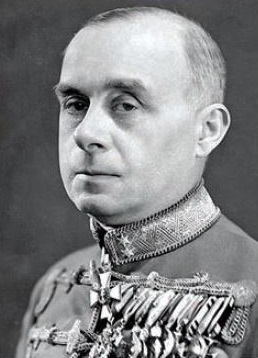Döme Sztójay facts for kids
Quick facts for kids
Döme Sztójay
|
|
|---|---|
 |
|
| Prime Minister of Hungary | |
| In office 22 March 1944 – 29 August 1944 |
|
| Regent | Miklós Horthy |
| Preceded by | Miklós Kállay |
| Succeeded by | Géza Lakatos |
| Personal details | |
| Born |
Dimitrije Stojaković
5 January 1883 Versec, Kingdom of Hungary, Austria-Hungary (today Vršac, Serbia) |
| Died | 22 August 1946 (aged 63) Budapest, Hungary |
| Cause of death | Execution by firing squad |
| Nationality | Hungarian |
| Political party | Party of National Unity |
| Spouse | Jozefa Landgráf |
| Profession | politician, diplomat |
Döme Sztójay (Serbian Cyrillic: Димитрије Стојаковић, 5 January 1883 – 22 August 1946) was a Hungarian soldier and diplomat of Serb origin. He served as the Prime Minister of Hungary in 1944, during World War II.
Contents
Döme Sztójay's Life and Role in World War II
Early Life and Military Career
Döme Sztójay was born Dimitrije Stojaković in 1883 in Versec (which is now Vršac, Serbia). When he was a young man, he joined the Austro-Hungarian Army. He became a colonel and fought in World War I.
After the war, Sztójay joined the Royal Hungarian Army. This army was led by Admiral Miklós Horthy. Sztójay became skilled in counter-espionage, which means he worked to stop spies.
Becoming a Diplomat
When Horthy became the Regent (a leader who rules for a king or queen) of Hungary, Sztójay was promoted to general. From 1927 to 1933, he worked as a military attaché in Berlin. This meant he was a military expert working at the Hungarian embassy in Germany.
In 1927, he changed his name to Sztójay. This was part of a process called Magyarization, where people adopted Hungarian names. From 1933 to 1935, he worked in the Hungarian Ministry of Defence.
In 1935, the Prime Minister at the time, Gyula Gömbös, made Sztójay the Hungarian ambassador to Germany. Sztójay held this important job until 1944. As ambassador, he became very close with the German government and often supported their ideas to his leaders in Hungary.
Hungary Under German Influence
In March 1944, during World War II, the German Army took control of Hungary. This event was called Operation Margarethe. The Germans forced Regent Horthy to remove the current Prime Minister, Miklós Kállay. Kállay, like Horthy, knew that Germany was losing the war. He had been trying to make agreements with the Western Allies (like the United States and Britain).
The Germans gave Horthy a choice: either choose a new Prime Minister who would cooperate with them, or face a complete German takeover. Horthy chose to appoint a new Prime Minister. He wanted to avoid Hungary being treated like other countries that Germany had fully occupied.
Horthy suggested Sztójay for the role. Even though Sztójay was known to be friendly with Germany, Horthy believed he was a soldier first. He hoped Sztójay would not give in to every German demand. The Germans agreed, and on March 23, 1944, Sztójay became Prime Minister and Minister of Foreign Affairs.
Sztójay as Prime Minister
As Prime Minister, Sztójay made several big changes:
- He made the Arrow Cross Party legal. This party was very similar to the Nazi party in Germany.
- He sent more Hungarian soldiers to fight on the Eastern Front against the Soviet Union.
- He closed down the country's labor unions.
- He put political opponents in jail.
- He took strong action against politicians and activists who supported left-wing ideas.
Sztójay also increased the forced movement of Jewish people from Hungary. However, Regent Horthy quickly became very upset by Sztójay's actions. Horthy demanded that Sztójay be removed from his position. But the German leaders, including Adolf Hitler, refused.
Horthy did not give up completely. He used his influence to stop some of the forced movements of Jewish people. He also managed to get another pro-German politician, Béla Imrédy, removed from Sztójay's government. Finally, in August 1944, the Germans gave in to Horthy's pressure. Sztójay resigned as Prime Minister, and Géza Lakatos took his place.
After His Time in Office
In October 1944, the Germans removed Horthy from power. Sztójay was not chosen to be Prime Minister again because he was not in good health.
When the Red Army (Soviet forces) drove the Germans out of Hungary in April 1945, Sztójay fled the country. He was later captured by American troops. In October 1945, he was sent back to Hungary.
Sztójay was put on trial by a special court in Budapest. He was found responsible for serious actions during the war and against the Hungarian people. He was sentenced to death and executed by a firing squad in Budapest in 1946.
See also
 In Spanish: Döme Sztójay para niños
In Spanish: Döme Sztójay para niños
 | Janet Taylor Pickett |
 | Synthia Saint James |
 | Howardena Pindell |
 | Faith Ringgold |

